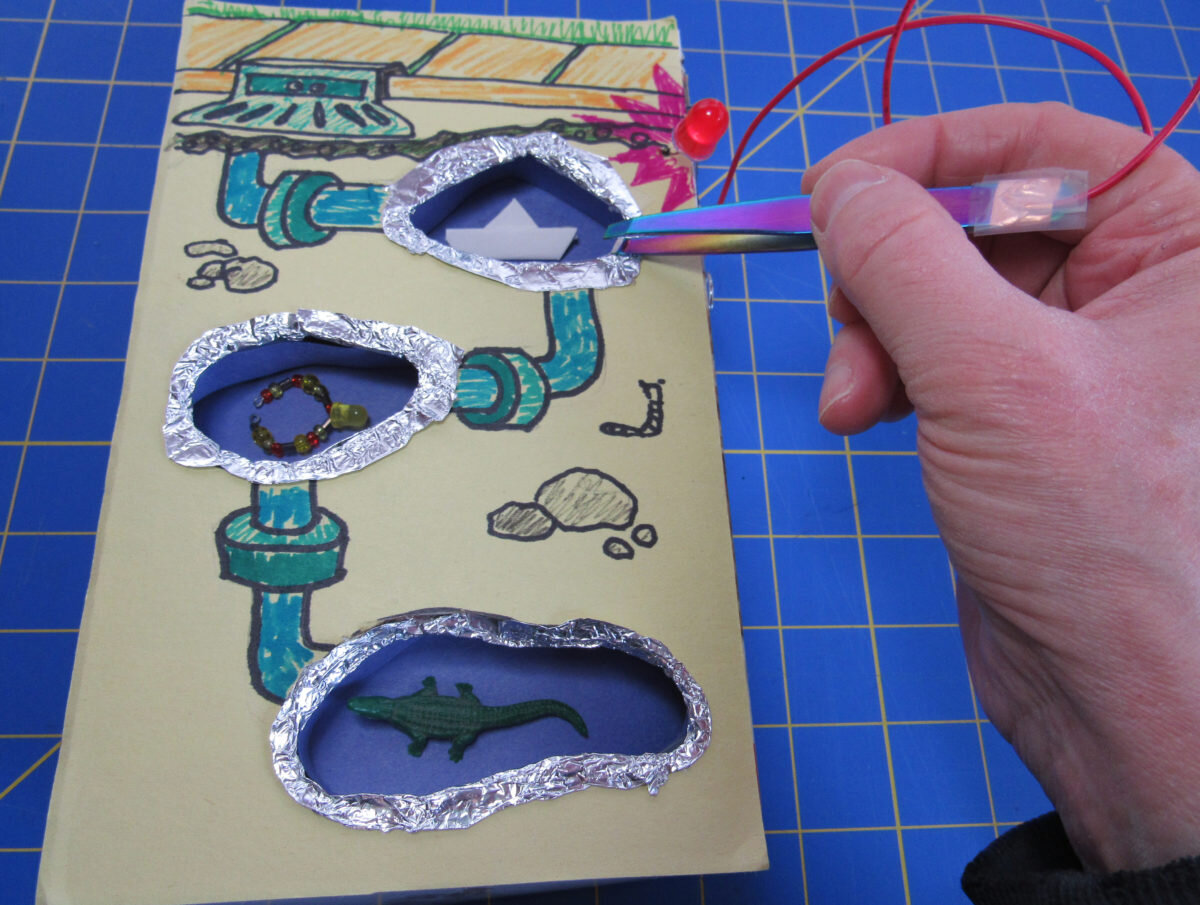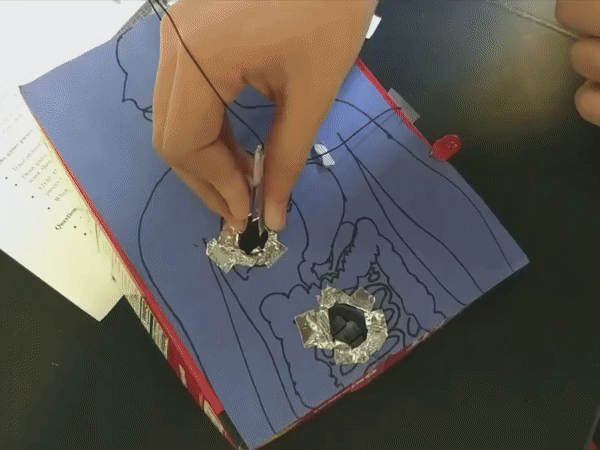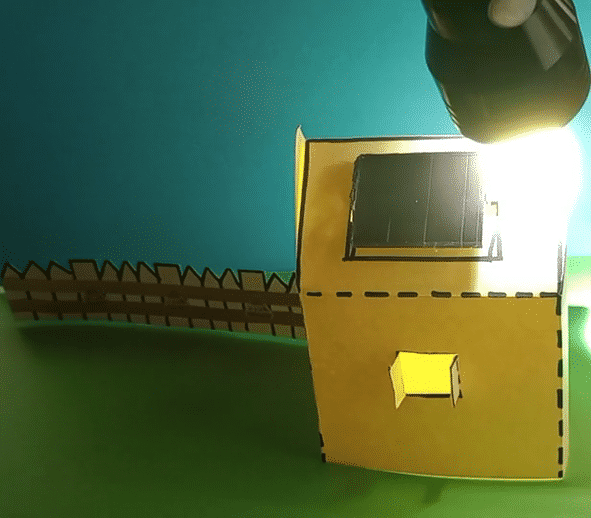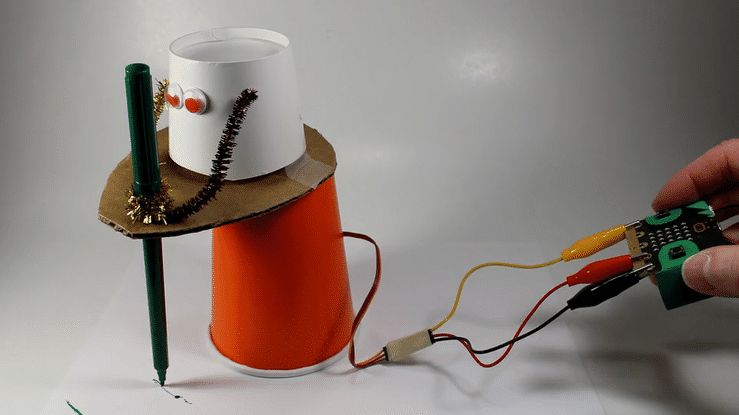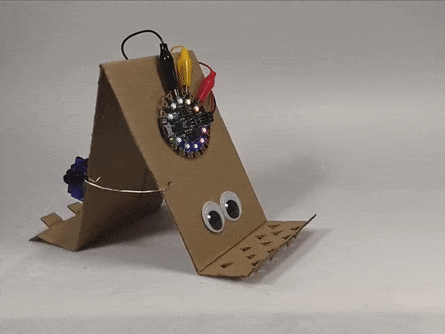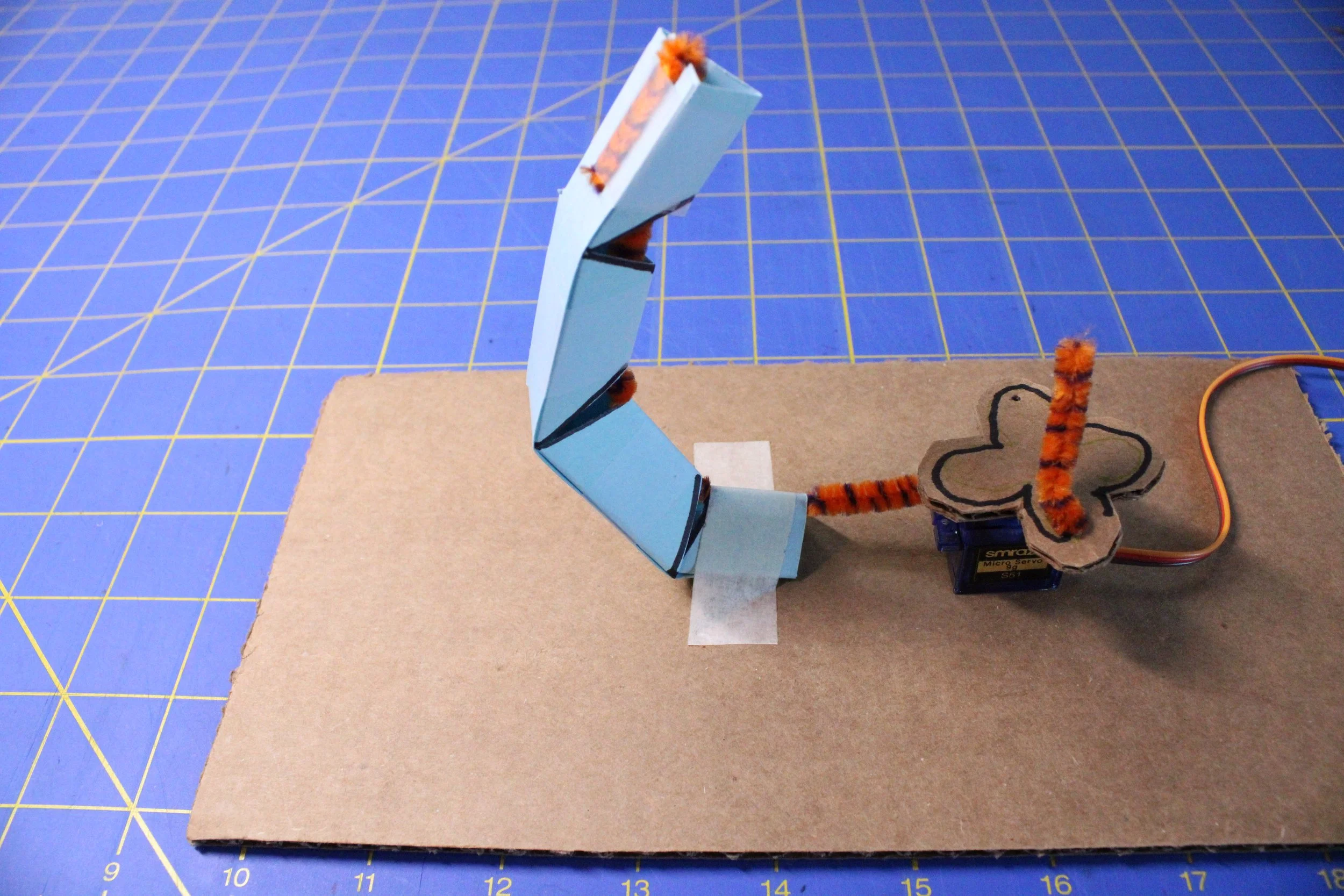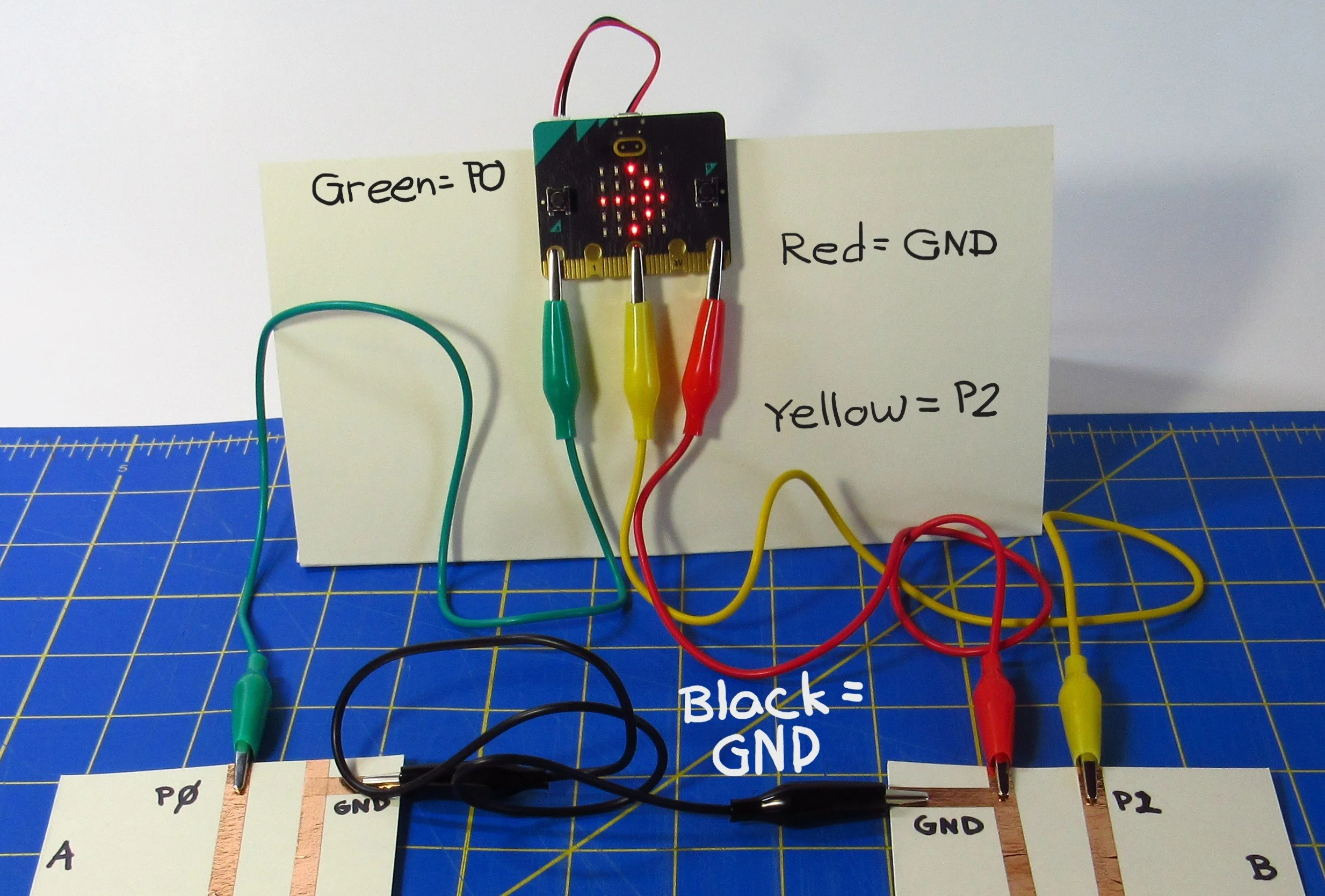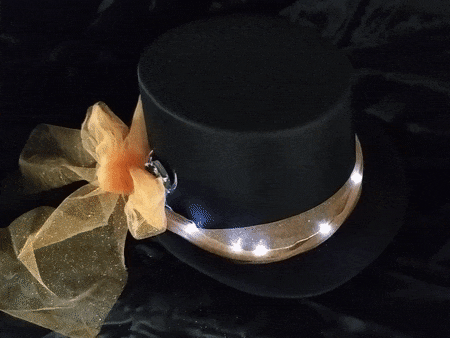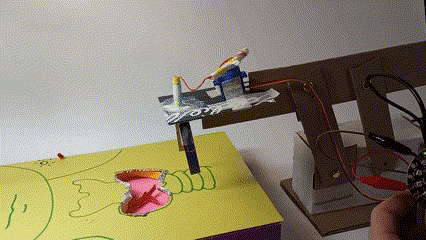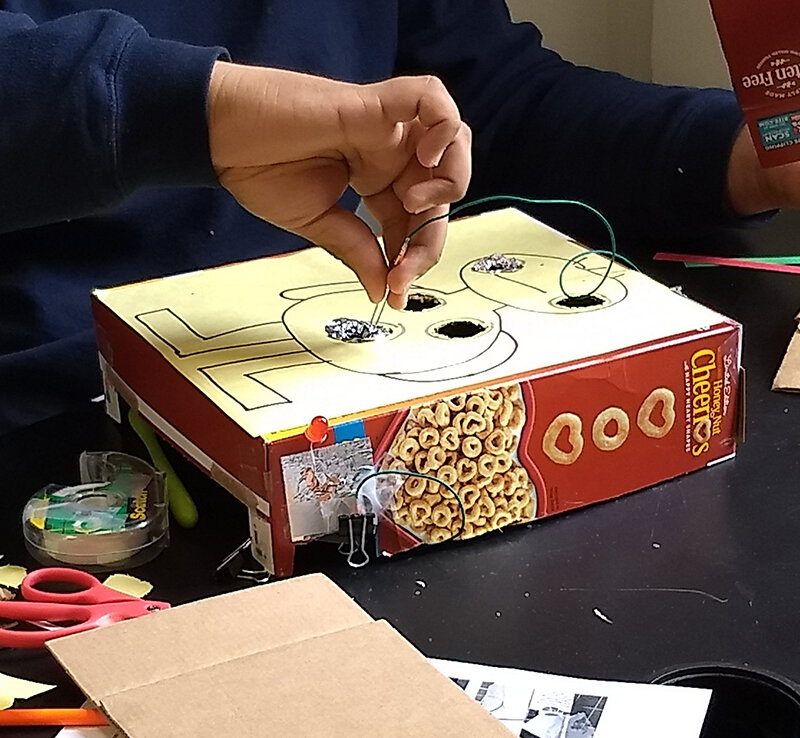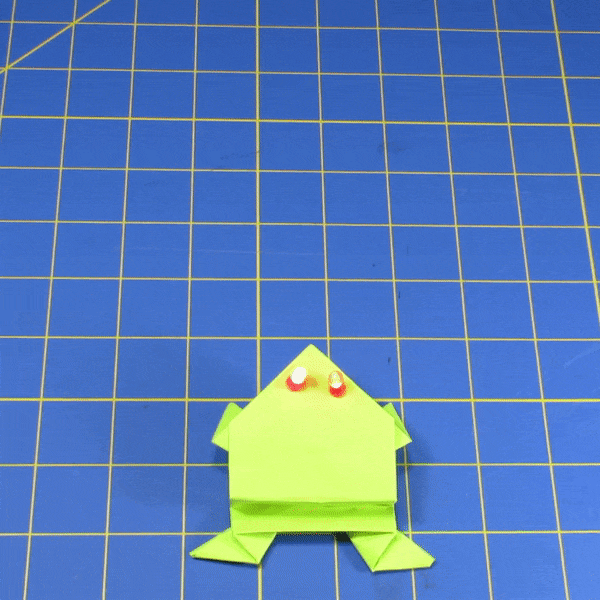Tech and Coding Workshops
Teens learn engineering skills and design concepts as they create their own projects from everyday stuff! Try a stand-alone workshop, or schedule a series of classes on one or more themes.
Projects are adapted from my books Making Simple Robots (2nd Ed), BOTS!, Paper Inventions, Fabric and Fiber Inventions, and Video Games and my tutorials for companies like Adafruit and Chibitronics.
Featured Teen STEAM Topics for Teens
Light-Up Paper Designs
Learn about electric circuits, switches, and sensors by making cool light-up paper creatures and other designs.
Ask about light-up origami, infinity mirror boxes, and other Paper Circuitry workshops.
DIY Buzzing Board Game
Remember the board game Operation, where players have to remove an object without causing the board to buzz and light up? In this version, use that same idea to design and build an electronic adventure game based on any theme or story you choose!
Ask about the programmable robot arm that can play your Operation game!
Build a Solar House
Learn about renewable ways of generating electricity by designing and building a Solar House that lights up in the sun.
Make a Programmable DrawBot
In this Intro to Coding workshop, teens learn how connect and code microcontrollers and servo motors using free, online software.
Workshop Details
Single-session workshops or multi-session courses
Suitable for teens ages 12-15
Maximum 15 participants per session
Choice of individual or team projects.
Fees based on class size, materials cost, and travel.
All crafts materials are included (except some recycled materials, such as cereal boxes)
Motors, lights, and batteries are included for participants to keep
Workshops include use of programmable microcontrollers and related hardware. Kits available for sale to add to your collection or provide to participants.
You provide laptops or desktop computers (limited laptops available to borrow).
We’ll be programming with free, online software including MIT’s Scratch and Microsoft MakeCode software.
Learn about the technology behind solar, wind, and other renewable energy sources by designing and building working models that use sensors and data monitors to maximize power production and minimize energy waste. No programming experience necessary! More details here.
MakeCode Cardboard Robots
In these robotics workshops for beginners, teens learn how to connect and program a microcontroller and servo motors using free, online Microsoft MakeCode and explore cardboard construction tips and tricks. They’ll design and prototype their own cardboard robots, share them with the class, and work together to test and improve them.
Projects may include:
Make a Programmable DrawBot with a tilt controller you build and code.
Make a Robot Inchworm that crawls along thanks to a clever mechanism.
Make an Animatronic Face, that changes expressions and can even lip-sync in time with music you play!
Make a Nature Based Robot that moves its tails, wings, or other parts using strings and wires.
Code-Design-Build!
Programmable Toys, Games, and Lights
Want to learn how to add lights, sound, motion, and sensors to electronic toys, games, or wearables you create? In this class, you’ll be challenged to develop projects that are fun, useful, or just for show — you decide!
Using basic computer science concepts, we’ll explore ways to integrate electronics with everyday materials, from recycled containers to clothing and accessories. It’s easy enough for beginners, thanks to small microcontroller boards like the Adafruit Circuit Playground Express or the BBC micro:bit and free, online, block-based Microsoft MakeCode software.
Projects may include:
Make a Reaction Race Game that tests your reflexes against an opponent.
Make a Tilt-Controlled Maze using motors to control the ball’s path.
Make a Musical Device, such as an electronic flute or keyboard shirt.
Make a Light Show wearable or decoration.
Electronics used: a re-usable microcontroller such as a BBC micro:bit or Adafruit Circuit Playground Express with USB cable and battery pack, alligator clip wires, servos, and conductive tape
Workshops tie in with projects from my books Making Simple Robots, 2nd Edition and Paper Inventions, 2nd Edition!
Design Your Own Buzzing Board Game!
Make a personalized version of the board game Operation, where players must remove game pieces without setting off the alarm! You choose the theme, design the board, and build the electric circuit that makes it work. All you need is a recycled box (cereal or cracker boxes work great) and some simple components. Turn your buzzing, light-up game board into a treasure map, an adventure story, or a test of skill — whatever sparks your imagination!
Each participant gets to make their own board game to take home!
Ask about the Robotic Surgical Arm series of workshops that goes with the DIY Operation Game!
Paper Circuitry
Click the photos to enlarge.
Learn how electric circuits, switches, and components work while you create some fun light-up paper models. Projects include:
Light-Up Creatures: The electrical circuit becomes part of the design as you create a Light-Up Mouse, RoboKitty, Dino, or creature from your own imagination!
Light-Up Origami: Learn to fold a traditional origami jumping frog or lotus flower, then add LEDs that light up with pressure sensor action or a magnetic reed switch!
Infinity Mirror Box (with hidden compartment): The lid of this box contains an optical illusion — a tunnel of color-changing lights that appears to go on forever. Makes a great gift box for hiding special treasures. Option of cut-and-fold template or advanced origami box.
Each participant gets to make their own project to take home!

